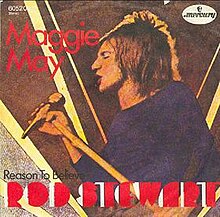Maggie May
| "Maggie May" | ||||
|---|---|---|---|---|
 German picture sleeve | ||||
| Single by Rod Stewart | ||||
| from the album Every Picture Tells a Story | ||||
| A-side | "Reason to Believe" | |||
| Released | July 1971 | |||
| Recorded | 1970 | |||
| Genre | ||||
| Length | 5:50 (Album version W/ Henry Intro) 3:43 (Single version) | |||
| Label | Mercury | |||
| Songwriter(s) | Rod Stewart, Martin Quittenton | |||
| Producer(s) | Rod Stewart | |||
| Rod Stewart singles chronology | ||||
| ||||
"Maggie May" is a song co-written by singer Rod Stewart and Martin Quittenton, and performed by Rod Stewart on his album Every Picture Tells a Story, released in 1971.
In 2004,
In 2017, the 1971 release of "Maggie May" by Rod Stewart on Mercury Records was inducted into the Grammy Hall of Fame.[4]
Background
"Maggie May" expresses the ambivalence and contradictory emotions of a boy involved in a relationship with an older woman and was written from Stewart's own experience. In the January 2007 issue of
The song was recorded in just two takes in one session. Drummer Micky Waller often arrived at recording sessions with the expectation that a drum kit would be provided and, for "Maggie May", it was – except that no cymbals could be found. The cymbal crashes had to be overdubbed separately some days later.[7][6]
The song was released as the
The album version of "Maggie May" incorporates a 30-second solo guitar intro, "Henry", composed by Martin Quittenton.[6]
The original recording has appeared on almost all of Rod Stewart's compilations, and even appeared on the Ronnie Wood retrospective Ronnie Wood Anthology: The Essential Crossexion. A version by the Faces recorded for BBC Radio appeared on the four-disc box set Five Guys Walk into a Bar.... A live version recorded in 1993 by Stewart joined by Wood for a session of MTV Unplugged is included on the album Unplugged...and Seated.
Chart performance
In October 1971, the song went to number one on the
The song re-entered the UK chart in December 1976, but only reached number 31.
At first, I didn't think much of "Maggie May." I guess that's because the record company didn't believe in the song. I didn't have much confidence then. I figured it was best to listen to the guys who knew better. What I learned is sometimes they do and sometimes they don't.
— Rod Stewart, 2015[6]
Weekly charts
|
Year-end charts
All-time charts
|
Certifications
| Region | Certification | Certified units/sales |
|---|---|---|
| New Zealand (RMNZ)[23] | Gold | 10,000* |
| United Kingdom (BPI)[24] | Platinum | 600,000‡ |
| United States (RIAA)[25] | 2× Platinum | 2,000,000‡ |
|
* Sales figures based on certification alone. | ||
Personnel
- Rod Stewart – lead vocals
- Ronnie Wood – electric guitar, twelve-string guitar, bass guitar
- Martin Quittenton – acoustic guitar
- Micky Waller – drums, cymbals
- Ian McLagan – Hammond organ
- Ray Jackson – mandolin (listed on the album as "The mandolin was played by the mandolin player in Lindisfarne. The name slips my mind.")[26]
- Pete Sears – celesta
Blur cover
The English alternative rock band Blur released a cover of Maggie May on their 1993 album Modern Life Is Rubbish.
See also
References
- ^ Reed, Ryan (18 September 2019). "Rod Stewart Preps New Orchestral LP 'You're in My Heart'". Rolling Stone. Retrieved 18 February 2021.
- ^ Erlewine, Stephen Thomas. "Best of Love: 16 Great Soft Rock Hits". AllMusic.
- ^ "500 Greatest Songs of All Time 2004 101-200". Rolling Stone. Archived from the original on 20 June 2008. Retrieved 23 September 2021.
- ^ https://www.grammy.com/awards/hall-of-fame-award#m
- ^ "Maggie May by Rod Stewart Songfacts". Songfacts.com. Retrieved 27 March 2014.
- ^ a b c d e Myers, Marc (23 October 2015). "Maggie May – A Song of Loss". The Wall Street Journal. Dow Jones & Company. p. D6. Archived from the original on 21 October 2015.
- ISBN 9781780890524
- ^ "John Peel". The Independent. 27 October 2004.
- ^ ISBN 1-904994-10-5.
- ^ "Go-Set Magazine Charts". www.poparchives.com.au. Barry McKay. January 2007. Retrieved 25 February 2017.
- ^ "Image: RPM Weekly". Library and Archives Canada. 17 July 2013. Retrieved 17 April 2016.
- ^ "Nederlandse Top 40 – Rod Stewart" (in Dutch). Dutch Top 40.
- ^ "Rod Stewart – Maggie May" (in Dutch). Single Top 100.
- ^ [Joel Whitburn's Top Pop Singles 1955–2002]
- ^ "Top 100 1971-10-23". Cashbox Magazine. Retrieved 7 February 2016.
- ^ * Zimbabwe. Kimberley, C. Zimbabwe: singles chart book. Harare: C. Kimberley, 2000
- ^ "Item Display - RPM - Library and Archives Canada". www.collectionscanada.gc.ca. Retrieved 23 June 2017.
- ^ "Top 100-Jaaroverzicht van 1971". Dutch Top 40. Retrieved 22 September 2020.
- MegaCharts. Retrieved 22 September 2020.
- ^ "Top Pop 100 Singles" Billboard 25 December 1971: TA-36
- ^ "Top 100 Year End Charts: 1971". Cashbox Magazine. Retrieved 30 May 2016.
- ^ "Billboard Hot 100 60th Anniversary Interactive Chart". Billboard. Retrieved 10 December 2018.
- ^ "Rod's Got The Face In New Zealand" (PDF). Cash Box. 30 March 1974. p. 53. Retrieved 11 November 2019.
- ^ "British single certifications – Rod Stewart – Maggie May". British Phonographic Industry. Retrieved 21 May 2021.
- ^ "American single certifications – Rod Stewart – Maggie May". Recording Industry Association of America. Retrieved 8 May 2021.
- ^ "Rod faces Maggie May action". BBC. 3 March 2003. Retrieved 5 December 2019.
External links
- Maggie May at Discogs (list of releases)
- Rod Stewart - Maggie May on YouTube
